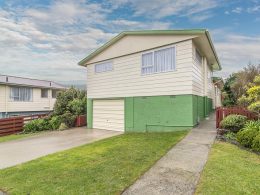Fellow property investors – it’s time we started being honest with ourselves. Taking care of your financial future is a good thing and you should be commended for it. At the same time, we have to admit to ourselves that every time we buy a 2-3 bedroom home in a suburban area, competing against first home buyers, we make it harder for those same buyers to secure their first home.
I’m here to tell you we can help, though. We can make a difference. You can secure your financial future and still help more Kiwis get into their own home.
So here’s the deal…
False numbers don’t help…
The Spinoff recently published an article by Andrew King, titled ‘pushing landlords out will only make renting more expensive’.
Andrew is the Chief Executive of the NZ Property Investors Federation. It is his job to fight and lobby for the rights of property investors.
Check out this quote, taken from the article above:
“An average 2.1 people live in owner-occupied housing in New Zealand, but there is an average 3.9 people per rental property. Every time a rental property is sold to an owner-occupier, on average 1.8 tenants still need a home to rent. “
Woah! That is a massive swing. Scary, in fact. Enough to make you do whatever you need to do to encourage more landlords to get involved! The author did not state where this info came from.
I thought those numbers sounded too far apart to be correct, so I checked with Stats NZ directly and they came back with this response:
“Data from the 2013 Census shows that an average of 2.6 people lived in housing that was owned by the household or the household held in a family trust, and an average of 2.8 people lived in rented housing. Based on these 2013 Census figures, every time a rental property is sold to an owner-occupier, on average 0.2 tenants still need a home to rent.”
Right, that’s a little bit less concerning. Looking at the correct numbers, it doesn’t, in practical terms, make much of a difference to occupancy rates if a home is owner-occupied or rented. So maybe if a few more landlords sold up, prices might go down and more people could afford to own rather than be stuck in the rent trap?
So many shades of grey
In reality, there is a lot more to this issue:
In order to make a statement about how an increase in homeownership would affect the allocation of people across houses, you need to consider the people ‘on the cusp’. Or in other words, the marginal renter vs the marginal owner – a family unit that would switch from renting to owning if prices were lower, or mortgage availability was greater. King’s statement compares the average renter with the average owner – which isn’t really comparing apples with apples.
University flats with 6 people are always going to be rented, as mobility is very high. They’re not going to switch to owner occupancy.
Perhaps the marginal renter is a family with 2 adults and 2 kids. If they switch from renting to home-owning, it is not like they will kick out the kids, it will just be that the pool of renters will change and the pool of homeowners will change. In this case, the occupants-per-dwelling would decrease for the population of rented properties, and increase for the population of owner-occupied properties.
What about supply and demand?
According to the Reserve Bank of New Zealand. 21% of all new residential mortgage lending in January 2018 was taken out by investors. In Jan 2016 investors were responsible for 31% of all new lending.
It seems affluent Kiwi’s are taking their retirement planning very seriously. A 3rd of all new mortgage lending seriously. Good on them for taking that step towards financial independence.
But guess who those investors are usually competing against…
In Jan 2018, first home buyers only made up 15% of all new residential lending.
The rest of the ‘new lending’ in Jan 2018 (62%) was taken out by ‘other owner-occupiers’. In other words, Mums and Dads and families moving up, or moving City. Since it is general knowledge that investors target ‘first home buyer’ type properties – as these are the kind that are easy to rent out (to all the people who can’t afford to buy), then I believe you can remove ‘other owner-occupiers’ from the equation and come to the conclusion that property investors are the biggest competition faced by would-be first home buyers.
Granted, some investors buy properties that first homers wouldn’t touch (like the aforementioned Uni flats) but for the most part, you’ll see them picking up 2-3 bedroom homes in decent suburbs, as these are the properties which experience the best capital gain (because there are always so many young couples trying to buy them).
If property investors were slightly less active in the market, do you think prices would drop? Potentially making it easier for young families to own their own home, rather than rent?
Want another telling statistic?
Go on, one more won’t hurt 🙂
Of all that new lending taken out in Jan 2018, a whopping 30% of it was on interest-only terms. That means the owners are generally not intending to pay that mortgage back anytime soon.
They are in fact, minimising their costs as much as possible while holding the property, in the hope that it goes up in value over time and they reap the rewards. They are relying on capital gain to provide a return on investment.
30% of all new lending is a large amount. That’s a lot of people chasing capital gain, not income for their retirement.
The bottom line is, first home buyers don’t take out interest-only mortgages. The banks are very hesitant to allow it when you are borrowing 80%. But if a 3rd of the market are able to take out more affordable, interest-only loans (and are doing so), how are young couples and families ever going to compete?
Ok, enough of the negativity, give me some solutions, dammit!
What can we as property investors do differently?
1. We can buy properties that first home buyers wouldn’t touch.
Look for houses with issues, like asbestos ceilings, unconsented additions, or ones that are in such a state that young families won’t take them on. Fix them up and rent them out and enjoy the fact that you will probably have much less competition on the buying side.
2. We can buy investment-type properties.
3 x 1 bedroom flats on one title might not suit a young family but it could be perfect for an investor. Go and compete with your own kind! For some crazy reason, most first home buyers don’t like home & income properties (my partner won’t let me buy one for us to live in). So until proven otherwise, these should be ok for investors to buy too 🙂
3. Sell family-type homes that we are holding as investment properties.
Are you renting out a home that would suit a young couple perfectly? Then let a young couple buy it. Swap it for something that better suits providing a long-term investment income (eg. has a higher yield).
4. Pay down our mortgages.
Don’t buy a property if you can’t afford to be chipping away at the mortgage. If you are going to buy an investment, then buy it and hold it forever. Let the mortgage be paid down over 20 years and then enjoy living off the rent in your retirement. Don’t hold a home just for capital gain. You are buying into the housing bubble.
5. Don’t squeeze every last dollar out of your tenant.
Charge enough to cover all your costs and keep paying the mortgage down, without going overboard. Use the tenancy website to find out the median rent for your area to see how your property stacks up. Allow loyal tenants the opportunity to save more towards a deposit. Just because other landlords are taking advantage of the $50 increase in the student living allowance, doesn’t mean you have to as well.
6. Don’t buy just for capital gain.
It is never guaranteed and it is purely a bonus when it happens. Funnily enough, you start to realise this once you own 2-3 properties. It doesn’t matter how much they increase in value, what matters is the weekly cash flow and how close you are to financial freedom. I would happily own 10 properties worth $100k each, with minimal prospect of capital gain, if they all made me $200 – 300 per week in rent.
7. Invest in our properties.
Don’t buy a home you can’t afford to invest in. If you can’t afford to update the home and improve it over time, then you shouldn’t really be owning it? Do your properties have heatpumps? Do they have insulation in accessible areas? Read: WCC rental warrant of fitness checklist
8. Subdivide
Do you own a 2-3 bedroom home in a good area with a decent section? Subdivide your property and build another dwelling to rent out or sell, thereby increasing the amount of housing stock available in the market (and further helping to secure your financial future).
Do you have other suggestions? Join the conversation – let me know your thoughts in the comments below.










Here is an idea:
make “buying a house” a zero-capital gain transaction (100% capital gains tax) and possibly even a criminal offence (and the same re: loaning any money for such a purchase) in any market (would need to define suburban boundaries) where the average price is over 4.5x average incomes as determined by verifiable statistics over at least 6 months; unless: the house is bought by a first-home buyer or owner-occupier shifting house, or for genuine occupation by relatives, or if the Minister of Housing allows a special exemption (e.g. for Kindergartens, rural GPs, etc.).
The housing hyper-inflation problem has been greatly amplified by the presence in markets of buyers chasing capital gains. All those who bought extra houses e.g. in last 5 years in Auckland and last 3 years in Wellington should be required to release those houses back to the market within 6 months or face a 30% capital gains tax, within 1 year or face 50% capital gains tax, or within 2 years and face 100% capital gains tax. In I think 1991, 76% of houses were owner-occupied, now I gather it is 50%. There needs to be a shift of housing stock back to owner-occupiers. Those who want to invest should be encouraged to invest in new houses and other enterprises. If necessary the Government should freeze bank assets and require banks to subsidise all those people, once they have negative equity, who paid ridiculously high prices that the banks should never have loaned them money to pay (Banks I gather took 5 billion from NZ- plenty to cover that). Every genuine home-buyer who pays $30-$200,000 more than they should have to on an ordinary suburban house, because of price-leveraging by speculators, is being robbed. It is time this avenue for banks and speculators to steal on a huge scale was stopped. It is time houses were for people to live in, not for a small group of people to make the majority in to rent-slaves and mortgage slaves. Also there appears to be huge pressure from high immigration- in Australia I think new immigrants have to buy new houses only- this would reduce pressure on the low supply of existing houses. Builders and related trades who build the most-needed types of houses in the most needed areas should pay no income tax till 500,000 more houses have been built, and learning these trades should receive major incentives.
Problem solved?
Let me keep it stupid simple, Andrew.
Property investors (those who buy properties to rent them out) drive the prices up. In case you have doubts, take your time and visit an auction room on a busy day. How many first home buyers do you see there?
There are other categories of investors – for example, do-uppers who buy, do-up and sell. Those are significantly different.
Yes, property investors are not the only issue of New Zealand housing market, but as far as I see, those make significant contribution. Man, you must know how many new houses are built recently in far end of Churton Park, and how many of those are sitting there unoccupied just to be sold 6-12 months later, right?
“plenty of good properties at a reasonable price out in the ‘burbs” is a separate point of discussion. I would say yes there are, I would not say it’s “plenty”. I would consider it is “reasonably” if an average working couple (~80-100K annual income) with a child in their early twenties can buy, pay off the mortgage in 15 years or so, the property does not pose an immediate or deferred danger to their health and good enough to raise children in it.
Long math story short, the price should be in a ballpark of $300-400k in order to satisfy the above. $450k is the maximum. These days when you were able to buy something for that much money has long gone.
I do not have a solution for this. However, it’s really questionable if current state of the market is anywhere near satisfactory. “Investors” (landlords and those who are after CG only) are clearly contributing a lot to driving the average price up. Happy to discuss further if you like.
I agree with Jackie 100%. You cant ignore the 62% of other home buyer some of them also competes with first time buyer. If you ignore them you also spinning the facts to prove a point you want to make.
Also don’t forget restricting bank lending to domestic property investors won’t reduce prices for at least 2 reasons:
1, it only stops small investors from buying. established and educated investors will find a way. Small investors are the majority in numbers the “mums and dads with a plan” but they only hold 1-2 investment properties so on the market they are the little fish.
2, If yield and prospect for capital gross is good investors will come from overseas (mainly Australia) especially if they don’t have to compete with local investors due to bank lending restrictions.
Thanks for getting involved Sandor, appreciate your comments.
Here’s my advice for ‘solving the crisis’:
First, stop calling it a crisis. Panic and FOMO leads to poor decision making. Buy when you are ready and can afford it, not because you are scared you’ll ‘miss out’. You are going to be alive a long time (hopefully!). Plenty of opportunities for you yet to come. Relax.
Educate ‘first home buyers’ that the banks want to see the discipline of actual savings, not just their Kiwisaver contribution (and whatever mum and dad will chip in). A lack of savings is a big reason ‘first home buyers’ are not actually buying. Kiwisaver is a bit of a myth that not many have cottoned onto – it won’t be the whole deposit, no matter how big it is, if you spend everything else you get paid.
Interest only mortgages are not necessarily for capital gain – they work better for improving cashflow. Given that the banks only give these for short periods of time, you need to have a plan to pay back or refinance by the deadline. It might be selling, or to have good rental cashflow.
Why ignore the 62% of buyers who are shifting house? They could be downsizing, upsizing or going sideways – in other words, might be competing with ‘first home buyers’ because that group are paying far more for property than they really ought to. And yet, NO ONE is criticizing them. Why not? Can’t pick on ‘mum and dad’? Why vilify landlords? They are just ‘mum and dad with a plan’, not someone with a cape and evil cackle (although dress-ups are fun, mawhahahaha).
There are plenty of good properties at a reasonable price out in the ‘burbs – look further afield first home buyers – better to have a foot on the ladder in a cheaper property than not even be close to being on the first rung in the CBD. Yes, you’ll sacrifice lifestyle opportunities – think of it as a good way to save!
Great comment Jackie, thanks for joining the conversation!